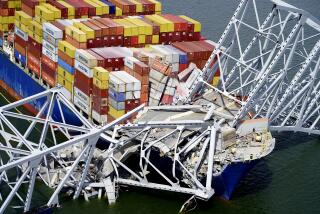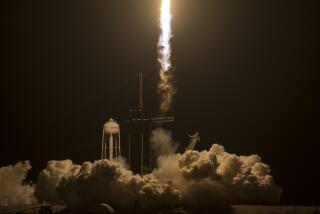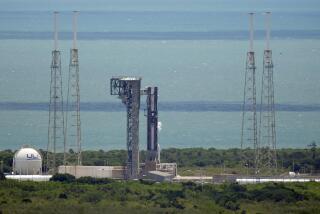Departing Cargo Ship Fails to Disconnect From Mir
- Share via
MOSCOW — A departing cargo capsule was unable to break free of the space station Mir’s fast embrace Monday, and Russian Space Agency officials postponed until today a second attempt to jettison the emptied craft to make way for a ship ferrying up food, fuel and equipment.
The unexplained failure of the empty ship to decouple from Mir raised anew the nagging question of whether the 11-year-old space station is safe enough to function as the world’s only orbital training base for next year’s inaugural phase of the International Space Station.
One official at the Mission Control Center outside Moscow, however, raised the possibility that this latest in a series of glitches, accidents and malfunctions may have been caused by human error: One of the crewmen may have left the hand brakes on.
“There is a physical obstacle that prevents the cargo ship from undocking,” explained Irina Manshilina, a Mission Control spokeswoman who said the electronic docking equipment appeared to operate properly. “Astronauts suspect that it might be the special braces that are used to secure the cargo ship to the station once the automatic stage of docking is over.”
Those braces act like an emergency brake to keep the two spacecraft locked together even in the event the electronic docking system fails, she said.
A quick inventory of the backup devices disclosed that two of the braces were missing, said Manshilina--a fact that led mission controllers to suspect the braces had been inadvertently left in place since the supply craft’s July 7 linkup.
*
Flight controllers were weighing other possibilities for the failed separation and would probably order the Mir crewmen back into the sealed-off Progress M-35 cargo capsule to check for the forgotten clips if no other explanation for the problem was discovered, she said.
Another cargo vessel, Progress M-36, blasted off from the Cosmodrome in Central Asia on Sunday night and was due to dock with Mir--in the port still occupied by its predecessor--at 8:42 p.m. today.
If Mir remains unable to jettison the empty craft, the incoming Progress can be kept in standby mode until Wednesday, said another Mission Control representative.
The arriving supply ferry is carrying the last of the repair kit needed to restore Mir to working order after a devastating June 25 crash involving an earlier cargo ship, Progress M-34. Former Mir commander Vasily Tsibliyev was practicing a remote-controlled docking maneuver with the garbage-laden supply drone when it went out of control and careened into the Spektr research module attached to another Mir port.
A just-completed visit by U.S. space shuttle Atlantis brought up other tools and equipment to repair punctures that depressurized Spektr, and also delivered U.S. astronaut David Wolf. The shuttle returned to Cape Canaveral in Florida late Monday.
NASA had to battle rising concerns in Washington that Mir has become inherently unsafe in order to follow through on plans to have the 41-year-old Wolf replace Michael Foale, a British-born NASA physicist who spent 4 1/2 harrowing months aboard the Russian space station.
Since the collision more than three months ago knocked out nearly half of Mir’s power-generating capacity, the station has at times had to ration energy even to vital life-support systems.
The Progress M-36 delivery and the results of an external inspection of the damaged Spektr module by the Atlantis crew were supposed to have allowed the Mir crewmen to finally repair the crash damage during an Oct. 20 spacewalk.
More to Read
Sign up for Essential California
The most important California stories and recommendations in your inbox every morning.
You may occasionally receive promotional content from the Los Angeles Times.











